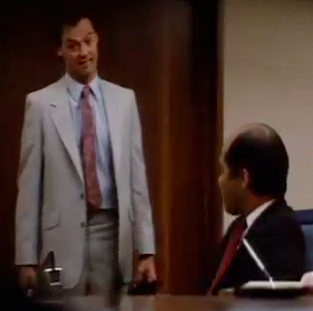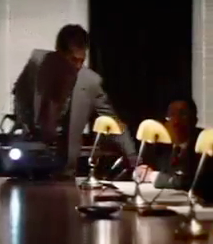UNIT OPENER: Comments and Analysis
|
1. How does the American greet the assembled Japanese executives? "Hi, fellas", he says to a group of Japanese executives seated around a conference table. He then introduces himself in (very broken) Japanese. This is not the normal way businessmen in Japan would act upon meeting each other for the first time. Rather, they would hand over their business cards with a slight bow. Like many aspects of Japanese culture, there are set rituals attached to conducting business in Japan. The American visitor would have made a better initial impression if he had followed these conventions. 2. What communication style does he use? He uses a very informal mode of address, talking freely and casually to the executives. He is speaking off the cuff and does not always use complete sentences. He does not demonstrate any particular deference (by lowering his eyes or bowing, for example). Nor does he seem conscious of the desirability of adjusting his language to an audience of non-native English speakers. In a real business context in Japan, particularly giving a presentation, the preferred communication style would be much more formal, with a prepared and well-rehearsed presentation in standard and grammatically correct language. 3. How could one characterize the kind of English he speaks? He speaks fairly quickly and in the same way he would talk to colleagues back home. He uses slang ('fellas", "lugged", "I am like crazy for your country", "it's damn nice", "jeez", "yikes"). He also tries to use humor to connect with his audience and lighten the mood - joking about how far he's schlepped the screen that's not needed or that the Japanese must be pressed for time since they have a "long day of staring" ahead of them. He also tries to make a pun about "putting out" - his Japanese audience is unlikely to be familier with the sexual usage of this term. Humor is tricky to get if it's not in your native language and that's even more the case with puns. American businessmen often have difficulty adjusting their English to the audience they are addressing, in large part because most are monolingual and therfore lack awareness of language pragmatics and language registers. 4. What differences are there between the American and the Japanese in terms of non-verbal communication? The Japanese executives are mostly silent. This is perceived as awkward by the American, or as a sign that the Japanese are not understanding him. Silence is a normal part of the communication process in Japan and long pauses in conversations are not unusual or considered undesirable. The American uses gestures quite a bit, and very informally, mostly illustrators that accompany his speech. He often adds emphasis to a sentence through body language, by leaning over and waving his hand to an executive or putting his hands on his hips. He is much more demonstrative than would be typical in a Japanese business setting. At one point, he pats one of the Japanese execs on the shoulder after making a joke. Japan is a low touch culture, and it would be even less appropriate in the more formal business setting than elsewhere to be touching someone in this way. Non-verbal conventions are very important in making a good impression, making yourself understood, and appropriately reinforcing your verbal message. 5. What topics does the American bring up that might not be appropriate, given the context? He complements the Japanese on the "real oriental" decor, asking "Did you decorate this place yourself"; these men are executives, unlikely to have been involved with the room decoration. The question might be appropriate in visiting a Japanese home, but not here. He also mentions that his dad "was over here with the army", a reference to the American occupation of Japan after World War 2, clearly not a good topic to bring up with this audience, which includes older men who might even have been involved in the war. The picture of Hazel, as well as his jokes about her, are not likely to be well received - Japanese tend to be more serious in formal business meetings. |
What's the point of this unit's opener?
This film is a comedy and as such it skirts the boundaries of likely behavior on the part of the American businessman. It's not likely either that the Japanese businessmen would stay seated when the foreign guest entered the board room. However, despite some caricatures, the film does highlight some principal distinctions between American and Japanese business cultures. The American earns points for trying to learn a few Japanese phrases (always desirable) but otherwise he misses the boat completely. In many parts of the world, the corporate culture and business etiquette are considerably more formal than in the U.S. and knowing the conventions (greetings, style of conversation, appropriate topics, normal seating arrangements, negotiation practices) is important if one is to be successful. Often American businessmen lose out to those from cultures (such as Western Europe) where there is a greater awareness of cultural diversity and more proficiency in speaking other languages.

